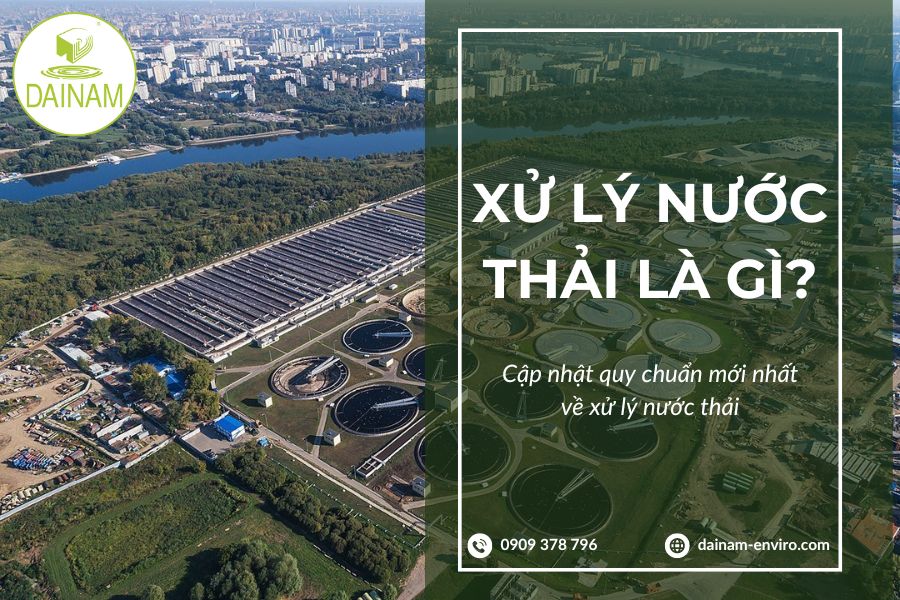The issue of wastewater treatment is becoming increasingly urgent due to population growth, alongside urbanization and industrialization. This poses a significant challenge for organizations, businesses, and communities in seeking effective solutions. In the face of this situation, understanding the wastewater treatment processes and technologies is crucial to ensure a healthy and sustainable living environment for the future.
1. What is Wastewater Treatment?
Wastewater treatment is the process of filtering various types of waste, impurities, hazardous substances, and organic matter out of water sources generated during the production processes of businesses or human activities. The ability to remove these wastes ensures the health of people and the natural environment surrounding them.
Furthermore, in Vietnam, the government has issued policies to ensure that businesses do not cause any harm to the environment. Currently, this process follows a common cycle consisting of several steps: preliminary treatment, physical, chemical, and biological treatment, etc. Subsequently, wastewater continues to be filtered to remove smaller solid particles.
Finally, with the biological treatment step, all remaining organic matter is completely filtered out. At this point, the water meets the output standards set by the State authorities. The ultimate goal of this process is to ensure that the discharged water is safe and sometimes can be reused as clean water for irrigation or household purposes.
2. The classification of Wastewater
Before entering the pretreatment process, wastewater is classified into different types. The purpose of this classification is to enable better wastewater treatment with the highest level of safety. Currently, there are four main types of wastewater as follows:
-
Domestic Wastewater: This type of wastewater is typically discharged in residential areas where households live. It often contains various chemicals from cleaning agents, soaps, or other waste substances such as fats, urine, organic matter, etc.
-
Urban Wastewater: This type of wastewater is not under the responsibility or management of any specific entity. It includes stormwater, untreated sewage discharged into streets, sidewalks, etc., as well as oil, animal waste, chemicals, etc.
-
Industrial Wastewater: This is one of the types of wastewater that requires careful treatment as it can be highly hazardous and pose a danger to the surrounding environment. This category includes wastewater from activities in the food industry, pesticide or fertilizer manufacturing plants, metal production plants, etc.
-
Medical Wastewater: Originating from healthcare facilities and research centers, medical wastewater includes domestic wastewater from hospitals, clinics, self-care cleaning solutions, radiation treatment chemicals, radioactive waste, containing dangerous pathogens, viruses during diagnosis and treatment processes.
3. Consequences of Inadequate Wastewater Treatment
3.1 The environment
Untreated or inefficiently treated wastewater can lead to serious pollution of water sources. Hazardous substances such as chemicals, viruses, and radioactive materials can seep into water bodies such as rivers, lakes, and ponds, resulting in severe consequences for ecosystems.
Polluted wastewater may contain harmful agents such as disease-causing bacteria and toxic chemicals. The use of this contaminated water can lead to serious health issues such as hepatitis, diarrhea, and neurological disorders.
Ultimately, improper wastewater treatment can also have economic ramifications. It can reduce agricultural productivity, diminish property values, among other effects. Therefore, investing in effective wastewater treatment is not only an environmental obligation but also an investment in the sustainable future of businesses.
3.2 The law
Failure to comply with legal regulations on wastewater treatment can lead to serious issues, including:
-
Enforcement Actions: Businesses may face enforcement measures if they fail to comply with wastewater treatment laws. These measures may include fines, revocation of operating permits, or even temporary suspension of business activities.
-
Reputational Damage: Non-compliance with wastewater treatment laws can also have negative consequences for a company's reputation. The public and community may protest and boycott businesses or organizations that do not adhere to environmental protection regulations.
4. Updating Standards on Wastewater Treatment
The standards on wastewater treatment in Vietnam are regulated in several main legal documents as follows:
-
QCVN 40:2011/BTNMT – National technical regulation on industrial wastewater
-
QCVN 28:2010/BTNMT – National technical regulation on medical wastewater
-
QCVN 14:2008/BTNMT – National technical regulation on domestic wastewater
-
QCVN 63:2017/BTNMT – National technical regulation on cassava starch processing wastewater
-
QCVN 25:2009/BTNMT – National technical regulation on leachate from solid waste landfills
-
QCVN 62-MT-2016/BTNMT – National technical regulation on livestock wastewater
-
QCVN 11-MT:2015/BTNMT – National technical regulation on wastewater from seafood processing industry
-
QCVN 01-MT:2015/BTNMT – National technical regulation on natural rubber processing wastewater
-
QCVN 12-MT:2015/BTNMT – National technical regulation on wastewater from paper and pulp industry
-
QCVN 13-MT:2015/BTNMT – National technical regulation on wastewater from textile dyeing industry
Through this article, it is hoped that readers will gain an appreciation for the significance of employing efficient wastewater treatment measures to safeguard water sources and the living environment. Dai Nam Environmental Company takes pride in being a trusted partner, offering effective solutions in the design and implementation of wastewater treatment systems.

